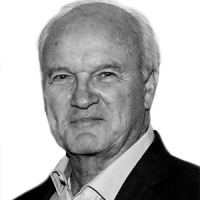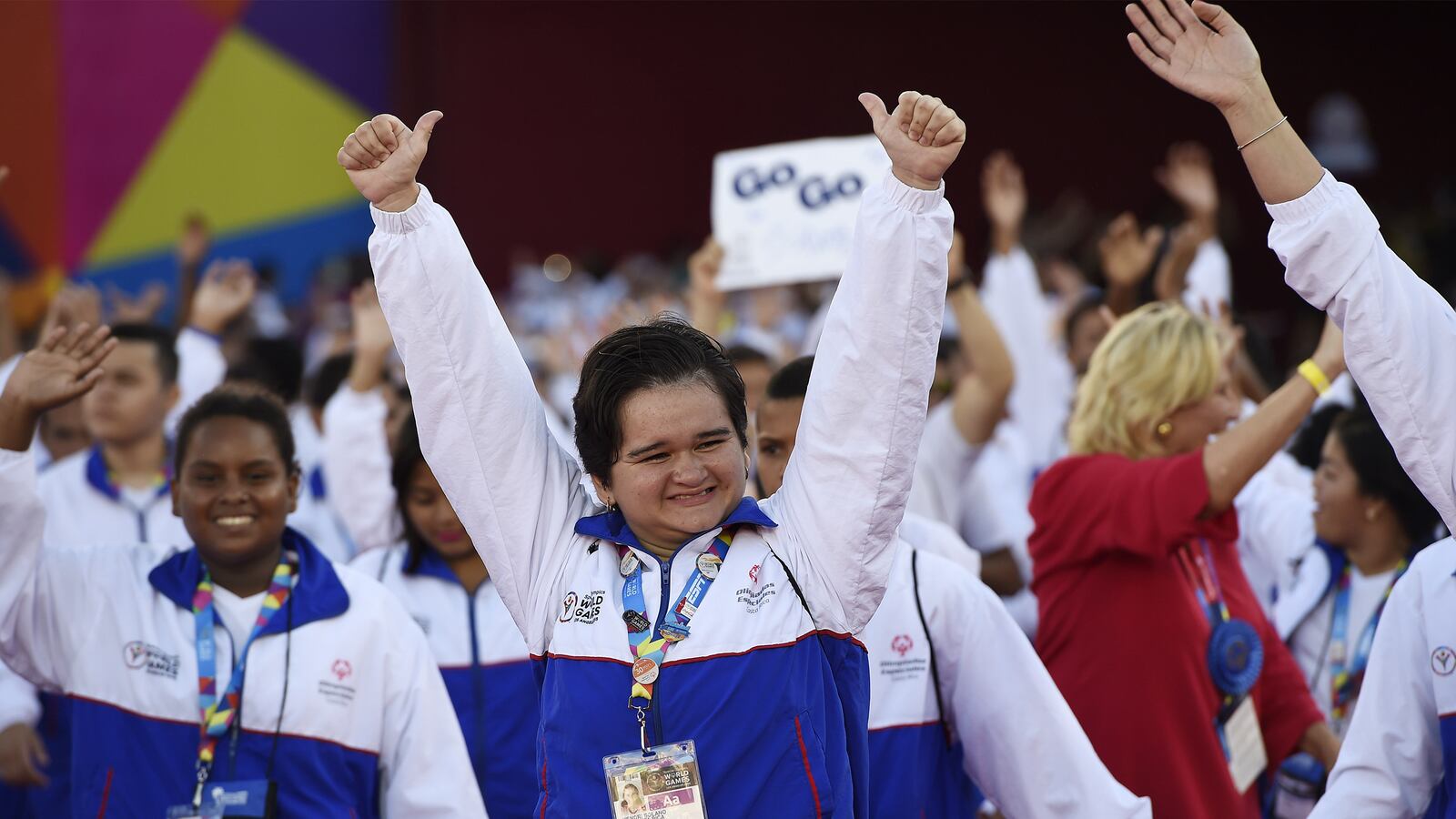LOS ANGELES — Thousands of white folding chairs were set up in long rows that stretched from one end zone to the other on the burnt lawn of the Los Angeles Coliseum as a brutal sun began to fade and slowly slide into the horizon over the Pacific. The chairs were separated by a wide aisle and a long red carpet had been spread on top of the grass. The carpet extended the distance of the historic field to a stage built around a symbol for the 2015 World Games Special Olympics.
Now, as dusk knocked on night’s door, bringing relief from the heat to nearly 70,000 spectators, the public address announcer began reciting the names of countries participating in the games. As each nation’s name was called, the crowd cheered and the athletes emerged from a tunnel beyond the far end zone and walked, ran and waved their way along the long, red carpet.
The Iraqi team walked on to the field after the Iranian team had been introduced. The Iraqi athletes wore blue. The Iranian athletes were outfitted in yellow, the two team colors offering the only hint of a difference in their reaction to competing in the Special Olympics.
“I love it here,” one of them, a young woman named Azizah, said to an interpreter. She said her family lives near Haditha in Iraq and that her father and brother had been killed in the fighting that has consumed her country for more than a decade.
“What do you love about it?” the interpreter asked her.
“Cherry Coke,” she replied.
Earlier in the day, hundreds of athletes assembled in a large conference room at the Marriott in downtown L.A. as different speakers described the events set to occur during the week, most of them televised on ESPN. There was a runner from Iran and a wrestler from Cambodia and a basketball player from Saudi Arabia and everyone in the hall was listening intently to Tim Harris.
Harris is 28 years old. He is from Albuquerque, New Mexico. His sport is basketball and he began participating in Special Olympics when he was 13 years old and it changed all the days and years ahead for him.
“I was born with Down syndrome,” he told the crowd of about 400. “And I am awesome. Because of Special Olympics I am not afraid. Do not be afraid.”
Harris owns and runs a restaurant in Albuquerque called Tim’s Place. He told the people sitting in front of him that his restaurant serves “good food and lots of hugs.”
“But the world can be a scary place,” he was telling them, “and some people want to scare you and some people just want to be scared. Not me.”
Tim Harris, we are told, lives with an intellectual disability. The athletes seated in front of him, cheering and thrilled to be competing this week, also live with a variety of intellectual disabilities.
As Harris spoke about being scared, there were more than a few adults across the continent in Washington, D.C., who spend an enormous amount of time each day trying to inject fear into our politics. A nuclear deal with Iran, they tell us, means certain war as if the region isn’t already broken by war. A proposal to provide common sense to a failed immigration program? Higher crime, more welfare, fewer jobs for Americans. Expanded health care coverage? Bankruptcy! That’s our fractured politics today. Much of it built on the growth industry of fear.
Twenty yards from the Iraqi team in the Coliseum, the Iranian athletes stood and swayed back and forth along with thousands of others, arms stretched toward the sky as Cassadee Pope stood on stage singing “Invincible.” To their right, athletes from Cambodia sang and danced on the lawn. A dozen rows away, the Vietnamese team did the same thing. Then there were the Iraqis and the Americans, the French, and athletes from Congo, India, Canada, Mexico, Japan…a world of people with intellectual disabilities who seemed to understand the concept of togetherness, inclusion, equality, diversity, fearlessness, and courage far better than those who loudly proclaim their own partisan views and narrow politics that have so divided this country and others too.
“This is a nice place,” one of the Iranian athletes said Sunday to an interpreter. “It’s so pretty and everybody smiles. It makes me happy to be here.”
Now, night had fully arrived at The Coliseum and a warm wind caused the pennants planted around the top of the old stadium to flutter beneath a fairly clear sky and stars that seemed to shine in the distant heaven. Tim Harris, restaurant owner, born with Down syndrome, living each day with a hug in his heart, stood on the stage and introduced “my friend, the First Lady of the United States, Michelle Obama.”
She walked out on to the stage and the two of them, Mrs. Obama and Tim Harris, hugged for more than a few seconds. Then she spoke, welcoming everyone to Los Angeles and America and as she did, many of the Iranian athletes and those from Iraq along with thousands of others on each team stood holding smartphones taking pictures of the wife of the President of the United States of America.
After she finished, a runner carrying the Special Olympic torch emerged from the runway at the far end of the field and handed the torch to another runner from another country who carried it to a third athlete and then another and another until, finally, the torch reached the stage, held by a Special Olympian who stood next to Rafer Johnson, who won a Gold Medal at the 1960 Olympic Games in Rome and lit the flame at the Olympics held here in The Coliseum in 1984.
Now, the sky was yellow as the torch lit a brand new flame for the 2015 Special Olympics. Fireworks erupted and the big crowd cheered as the athletes hugged anyone around them and applauded the night, the ceremony and themselves. The evening was over and now it was time to have the games begin while others in distant capitols play their own games where the definition of winning is far different than it is here, where courage means simply showing up.





